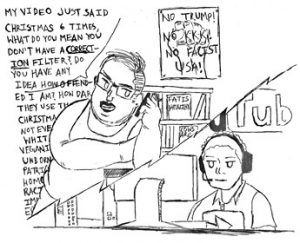When PC Culture Goes too Far
Are we as a society going way too far in our pursuit of a perfectly unoffended populace?
December 17, 2018
With the recent wave of backlash and spotlights on institutions such as Harvard University and their alleged screening of Asian-American applicants, the national conversation is turning to social boundaries— what constitutes them, and should they be enforced? This has led to political correctness becoming a social institution in our society. Political correctness (PC) is the act of eliminating speech and practices that could offend people, which ultimately keeps an environment sterilized of controversy. Sounds peaceful, right? And it is— in moderation. Originally meant to make minorities feel more comfortable and represented, PC has quickly morphed into a censor board. Don’t get me wrong— while Americans should definitely be incensed at racism, sexism, and ageism (albeit other forms of discrimination), focusing too heavily on pedantic debate only serves to give political correctness a reputation of creating hypersensitivity. People may see PC as a push towards over-censorship, but if balanced and done in a correct manner, it can lead to better communication. Generally, liberals push towards progressive political correctness while conservatives rally against it. Neither are correct; over-sterilization of daily exchanges only serve to frustrate people and push them apart, as constant watching what you’re saying so as not to offend anyone can get grating. However, dismissing it will foster insensitivity and make it difficult for minorities to be heard. People should learn to find the right balance between fostering interaction and stopping hate speech from spreading.
Due to this erroneous conflation of censorship and political correctness, people have begun to tire of the enforced and widely disillusioned narrative that political correctness brings about a conversation, and far-right politicians have taken it one step further and see it as a method of suppressing free speech, and attempt to use their anti-political correctness to further political agendas, as seen with 2016 Republican presidential candidate Ben Carson, who even went so far as to propose that it was the center of a plot to enslave Americans. Non-minority groups feel like they are being unfairly targeted and disliked, breeding a sense of resentment; as evidenced in the 2016 presidential election, candidate Donald Trump’s ill-planned and highly offensive comments were lauded as a retaliation to the evils of political correctness, rather than being seen as a serious potential diplomatic issue. Sylvia Allen, a member of the Arizona State Senate present at his Phoenix rally, even she praised him because he is “anti-left, he’s anti-PC, he’s anti-stupid.” To Trump’s credit, he was aware of his newly found niche and kept playing it up, which helped lead to his divisive victory.
Another point is that people tend to focus on the wrong things. Perceived appropriation of things as trivial as cultural hairstyles, people sampling cultural music, artists using cultural motifs, or cooking another country’s cuisine draws unnecessary scorn from so-called social justice warriors, all on the erroneous basis of misappropriation. It seems as if every article about a celebrity or designer seems to end with someone in the comments pointing out inconsequential mistakes. When Kim Kardashian allowed her daughter North to get North’s hair straightened on her birthday, a plethora of people came out with mean tweets and comments accusing Kardashian of supposedly erasing North’s biracial identity. In the scheme of things, though, there’s really no purpose to fighting over whether somebody’s hairstyle isn’t to another’s liking. What does this solve? Despite slapping the label of enforcing PC on their attacks, they really are just driving people with genuine opinions and a right to voice them away.
This gravitation towards social conformity of what is considered “respect” is counterintuitive as it takes away from free speech and generally unifying conversation. People live in fear that their seemingly innocent words could be scrutinized and shamed. Contrary to its initial purpose of unifying people and creating a ‘safe space’ where people can converse without worry of other people’s judgment, it’s doing the exact opposite, with 80% of Americans tired of being hyper-aware of every word that comes out of their mouths and afraid to converse and risk offending others. The political schism in this country has grown deeper, with polarizing opinions that unnecessarily attack people who mean no harm.
Everyone, the world isn’t HuffPost. Calm down, take a step back, and start up a conversation free of judgement—what others say may surprise you.











